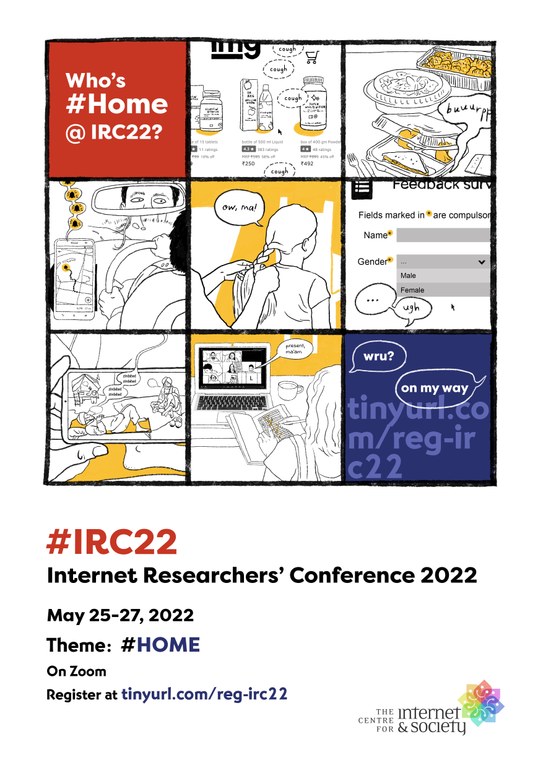Internet Researchers Conference 2022 (IRC22): #Home, May 25-27
-
RAW
Puthiya Purayil Sneha
24 May 2022
Venue: Online on Zoom
Registration: https://tinyurl.com/reg-irc22
Code of Conduct: Download (PDF)
Conference Programme: Download (PDF)

The ‘home’ has been a key line of defence in efforts to curtail the spread of COVID-19. Public health recommendations and governmental measures have enforced numerous restrictions on daily living, including physical distancing and isolation, home confinement, and quarantining. These mandates to be at home have relied on the construction, and assumption, of home as a familiar, stable and safe space.
However, home has always been a site of intense political contestation—be it through the temporal frames of belonging, ideas of citizenship and regionalism, role in the reproduction of capital accumulation, or as material signifiers of social status. Over the past 2 years, digital infrastructures have played an intensified role in the meaning making of the home. Coming to terms with the pandemic entailed an accelerated embedding of digital systems in many of our relationships. Be it with the state, educational institutions, workplaces, or each other. Solutions to the many challenges of infrastructure and mobility emerging over the last year have been sought in digital technologies. The digital mediation of the pandemic has ushered in visions of the ‘new normal’ as situated wholly in the digital.
While the initial anxieties of living through the pandemic may have now eased, and we make forays into a changed world, the spectre of the ‘next normal’ awaits. As we continue to come to terms with, and find ways to reorient the disruption of life, being at home has acquired many new meanings. What has it meant to be at home, and what is home? What is and has been the role of the internet and digital media technologies in navigating the contours of a changing ‘normal’? How have/can digital technologies help overcome, or exacerbate existing social, economic and political challenges during the pandemic? What forms of digital infrastructure—tools, platforms, devices and services—help build, sustain and alter the notion of home?
For IRC22, we invited sessions across a range of formats and themes to explore and challenge conceptions of the home. Different people imagine and experience the home in various ways—as a space of refuge and comfort, but also as one of violence, care, labour and/or movement-building. We invited contributions that speak to these provocations through one or more of the above thematic areas. A set of 12 sessions were finalised for the conference (including 4 individual presentations), based on peer selection by teams and presenters who proposed sessions as well as an external review.
Sessions
#WaitingForFood – Rhea Bose and Nisha Subramanian
#thismightnotbeonline – Kaushal Sapre and Aasma Tulika
#IdentitesVulnerabilitiesOpportunitiesDissent – Saumya Tewari, Manisha Madhava, Dhrupadi Chattopadhyay and Aparna Bose
#HomeAndTheInternet – Dona Biswas, Bhanu Priya Gupta and Ekta Kailash Sonwane
#LetsMoveIn – Arathy Salimkumar, Faheem Muhammed, Hazeena T and Manisha Madapathy
#LockdownsAndShutdowns – Michael Collyer, Joss Wright, Andreas Tsamados, Marianne Díaz Hernández and Nathan Dobson
#IdentifyingtheIdeaoflLaborinTeaching – Sunanda Kar and Bishal Sinha
#HomeBasedFlexiworkInCovid19 – Sabina Dewan, Mukta Naik, Ayesha Zainudeen, Gayani Hurulle, Hue-Tam Jamme and Devesh Taneja
#Involute:Jagged Seams of the Domestic and the Vocational – Akriti Rastogi, Deepak Prince, Misbah Rashid and Satish Kumar
#DigitisingCrisesRemakingHome – Vidya Subramanian, Kalindi Kokal and Uttara Purandare
Individual Presentations
#GoingHome: Constructions of a Digital-Urban Platform Interface in Delhi-NCR – Anurag Mazumdar
#SocialMediaActivism – Anushka Bhilwar
#TransActandWhatFollowed – Brindaalakshmi K
About the IRC Series
Researchers and practitioners across the domains of arts, humanities, and social sciences have attempted to understand life on the internet, or life after the internet, and the way digital technologies mediate various aspects of our being today. These attempts have in turn raised new questions around understanding of digital objects, online lives, and virtual networks, and have contributed to complicating disciplinary assumptions, methods, conceptualisations, and boundaries.
The researchers@work programme at the Centre for Internet and Society (CIS) initiated the Internet Researchers Conference (IRC) series to address these concerns, and to create an annual temporary space in India, for internet researchers to gather and share experiences.
The IRC series is driven by the following interests:
- creating discussion spaces for researchers and practitioners studying internet in India and in other comparable regions,
- foregrounding the multiplicity, hierarchies, tensions, and urgencies of the digital sites and users in India,
- accounting for the various layers, conceptual and material, of experiences and usages of internet and networked digital media in India, and
- exploring and practicing new modes of research and documentation necessitated by new (digital) objects of power/knowledge.
The first edition of the Internet Researchers Conference series was held in February 2016. It was hosted by the Centre for Political Studies at Jawaharlal Nehru University, and was supported by the CSCS Digital Innovation Fund. The second Internet Researchers Conference was organised in partnership with the Centre for Information Technology and Public Policy (CITAPP) at the International Institute of Information Technology Bangalore (IIIT-B) campus on March 03-05, 2017. The third Internet Researchers Conference was organised at the Sambhaavnaa Institute, Kandbari (Himachal Pradesh) during February 22-24, 2018, and the theme of the conference was *offline*. The fourth Internet Researchers Conference was held at Lamakaan, Hyderabad from January 30 – February 01, on the theme of the list.
Legacy URL: https://cis-india.org/raw/irc-22-home